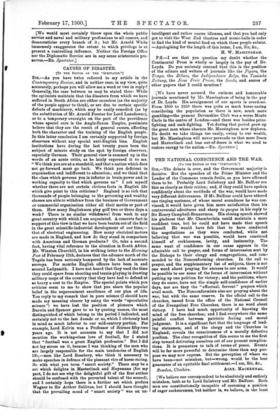CAUSES OF DISASTER.
[TO THE EDITOR OF THE "SPECTATOR."]
SIR,—As you have twice referred to my article in the Contemporary Review, and in neither case, in my view, quite accurately, perhaps you will allow me a word or two in reply? Generally, the case between us may be stated thus : While the optimists maintain that the disasters from which we have suffered in South Africa are either causeless (as the majority of the people appear to think), or are due to certain specific defects of machinery, which may be easily remedied (as by the substitution of Mr. Arnold Forster for Lord Lansdowne), or to a temporary oversight on the part of the providence whose special care is the Anglo-Saxon Empire, pessimists believe that they are the result of general causes, affecting both the character and the training of the English people. In this latter conclusion I am certainly supported by foreign observers without any special anti-English bias. English institutions have during the last twenty years been the subject of minute study on the spot by foreign observers, especially German. Their general view is summed up in the words of an acute critic, as he lately expressed it to me. " We think you are at a standstill, and that a nation which does not go forward must go back. We think you deficient in organisation and indifferent to education; and we think that the class which governs you is inferior in brain-power and in working capacity to that which governs us." I ask myself whether there are not certain obvious facts in English life which give point to this criticism? England is so rich that thousands of people belonging to the governing and wealthy classes are able to withdraw from the business of Government or commercial organisation either all their merits or part of them. How many Englishmen play golf two or three days a week ? There is no similar withdrawal from work in any great country with which I am acquainted. A concrete fact in support of this view is that we have been beaten out of the field in the great scientific-industrial development of our time,— that of electrical engineering. How many electrical motors are made in England, and how do they stand in comparison with American and German products ? Or, take a second fact, having vital reference to the situation in South Africa. Mr. Winston Churchill, in his striking letter to the Morning Post of February 12th, declares that the advance north of the Tugela has been seriously hampered by the lack of accurate surveys. For months English officers have been in and around Ladysmith. I have not heard that they used the time they could spare from shooting and tennis-playing in drawing military maps of the country that they have had to defend at so heavy a cost to the Empire. The special points which you criticise seem to me to show that you share the popular belief in the supereminent excellence of our plan of life. You reply to my remark that in pure science (I should have made my meaning clearer by using the words "speculative science ") we have lost the position of pioneers which Darwin and Spencer gave to us by quoting names, the most distinguished of which belong to the period I indicated, and certainly not to the last decade or so, which I obviously had in mind as much inferior to our mid-century portion. For example, Lord Kelvin was a Professor of Science fifty-two years ago. It is not accurate to say that I did not mention the working-class love of football, for I stated that "football was a great English profession." But I did not lay stress on it, because I was thinking of the men who are largely responsible for the main tendencies of English life,—men like Lord Rosebery, who think it necessary to make speeches in defence of the pleasant vice of horse-racing. So with what you term "smart society." There may be a set which delights in Maeterlinck and Huysmans (for my part, I do not see why the delightful gift of the first author should be confused with the perverted talent of the second), and I certainly hope there is a farther set which prefers Wagner to Sir Arthur Sullivan, but I should have thought that the prevailing mood of "smart society" was an un-
intelligent and rather coarse idleness, and that you had only got to visit the West End theatres and music-halls in order to find the kind of mental food on which these people subsist. —Apologising for the length of this letter, I am, Sir, &c., H. W. MASSLNGRAIL
P.S.—I see that you question my doubt whether the Continental Press is wholly or largely in the pay of Dr. Leyds. Do you seriously contend that this is the position of the editors and writers of journals like the Figaro, the Temps, the Debats, the Ind/pendance Beige, the Vossische Zeitung, the Neue Freie Presse, the Secolo, and scores of other papers that I could mention ?
We have never accused the eminent and honourable journals mentioned by Mr. Massingham of being in the pay of Dr. Leyds. His arraignment of our sports is overdone. From 1800 to 1850 there was quite as much horse-racing considering the population as there is now, much more gambling—the present Devonshire Club was a worse Monte Carlo in the centre of London—and there was besides prize- fighting and cock-fighting. Yet during that period grew up the great men whose absence Mr. Massingham now deplores. No doubt we take things too easily, owing to our wealth, but Mr. Massingham will never persuade us that more Ibsen and Maeterlinck and less out-of-doors is what we need to restore energy to the nation.—En. Spectator.]






































 Previous page
Previous page